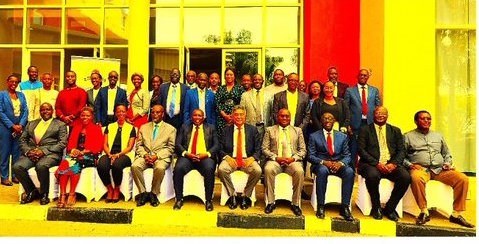|
Getting your Trinity Audio player ready…
|
The East African Business Council, COMESA, and SADC Business Council have officially launched and formed the African Tripartite Business Council to spearhead the inclusion of private sector policy proposals into the negotiations of the African Continental Free Trade Area (AfCFTA) Agreement and the African Tripartite Free Trade Area (TFTA).
This is one of the resolutions from the consultative meeting of regional business councils on the implementation of the African Continental Free Trade Area (AfCFTA) agreement organized by the East African Business Council (EABC) with support from TradeMark East Africa (TMEA).
John Bosco Kalisa the CEO of the EABC said, the region’s private sectors play a pivotal role in the implementation of AfCFTA, therefore, the need to include their views in the implementation of the continent’s free trade framework.
“The African Tripartite Business Council will put forward joint private sector policy positions to the AfCFTA secretariat in Ghana and tripartite ministerial council meetings in order to accelerate the implementation of the agreements,” said, Mr. John Bosco Kalisa, EABC CEO.
Kalisa called upon the member states from COMESA, the East African Community (EAC), and the Southern Africa Development Community (SADC) to ratify the Tripartite Free Trade Area to achieve the threshold of 14 ratifications required to enable the agreement to enter into force.
Speaking at the same meeting, Dickson Poloji, the CEO of COMESA business council said, it is vital for the private sector to be knowledgeable of the trade instruments of rules of origin, standards, and dispute settlement mechanism under the AfCFTA, if they are to benefit from the economic block.
He elaborated that the implementation committees of the AfCFTA should be co-chaired by the private sector.
On his part, Peter Varndell-CEO, SADC business council said, that the African Tripartite Business Council will improve coordination and development of positions on AfTCFA policy formulation and negotiations.
Mr. Dennis Karera, EABC vice chairman said, noted that trading under AfCFTA is the answer for Africa to respond better to external shocks of conflict, Covid-19, and climate change.
Presenting a paper on the role of ICT in promoting regional trades, Ms. Nadia Uwamahoro, managing director, of data systems, urged the finalization of the AfCFTA protocol on digital trade to promote youths and the emergence of African-owned e-commerce platforms.
Mr. Antoine Muzaneza, EABC Vice Chair, urged capacity building for the private sector on the benefits of AfCFTA and strategies to boost agriculture and industrial value addition and said this can be achieved if the private sector has access to cheap credits.
“Of importance is the access to affordable credit and private sector involvement in the development of the national strategies on AfCFTA,” said Antoine Muzaneza Senior officer of the EABC.
He added that it’s high time Africa’s private sector grows strong. This will solve many economic shocks that are emerging in the world such as climate change, and wars like that of Russia and Ukraine, that have greatly affected economies on the African continent.
African countries depend on imports of food and energy and will be hurt by higher global energy prices due to the Russia-Ukraine war.
The war has disrupted wheat imports into the region. 16%-17% of food imports for East African countries are wheat and approximately.50% of wheat imports are from Russia and Ukraine, he explained.
Dr. Rodgers Mukwaya from UNECA sub-regional office for Eastern Africa, said “The COVID pandemic and the Ukraine crisis have disrupted global supply chains. As a result, firms and nations are moving away from global to domestic and regional supply chains. We have to leverage the AfCFTA to create regional value chains.”
Dr. Mukwaya elaborated that African Central Banks have to control inflation without adversely affecting GDP growth.
Mr. Angelo Lado Gore, General Manager of South Sudan Chamber of Commerce, Industry, and Agriculture said “South Sudan has the potential to be an agriculture hub and change the country’s narrative of oil dependence and conflict.”
Stuart Mwesigwa, EABC Board Member said there is a need to disrupt the status quo regarding the delay in the implementation of AfCFTA and TFTA by moving faster as the private sector and trade.
Commenting on East African Community trade issues, Victor Ogola, Deputy Chief Executive Officer of Kenya Private Spector Association said that the region is challenged with the problems of counterfeit products and illicit trade which negatively set back the growth of local industries in the region and Africa at large.
“East Africa losses $500 million each year due to illicit trade,” he said.
